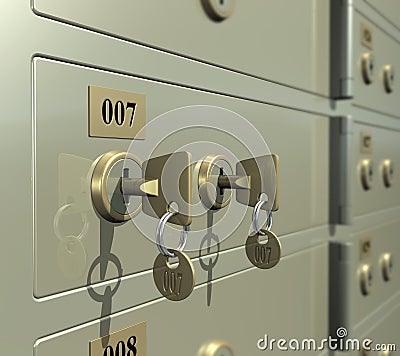
A safe deposit box, also known as safety deposit box is a shelf, drawer or container, usually held within a larger safe or bank vault, in a post office or any other institution.
The safe deposit boxes are used by people, within or without the bank to store valuable possessions or documents that need safe keeping such as wills, academic certificates, precious metals, currency, logbooks, title deeds, marriage certificates, insurance policies, jewelry, foreign currency, educational certificates among others.

These boxes are said to be resistant to fire, floods and theft, and their contents are covered by the bank’s insurer.

On Tuesday afternoon, Flying Squad officers intercepted Sh2 billion in fake currency in a personal safe deposit box at Barclays Bank, Queensway branch, in Nairobi.

How much does this service cost?
The Co-operative Bank of Kenya offers a standard annual fee of Sh3,000 while Stanbic, CBA and I&M rates are dependent on the size of the box, which is determined by the bulk of the contents.
Stanbic charges its clients between Sh2,400 and Sh6,000, exclusive of a 16 per cent value added tax. Standard Chartered Bank halted the service in 2010.

I&M safe deposit clients are not subjected to any charges. Rather, they are required to place an interest-free security with the bank.
The amount differs depending on the size of the box. Clients are also required to hold personal accounts with the bank. The deposit ranges from Sh80,000 to Sh300,000 and the money is refundable.

For CBA, the annual cost ranges from Sh2,000 to Sh5,800 depending on the size of the box.
The client pays Sh200 per visit and is required to deposit a fee of Sh10,000 which is non-interest bearing and refundable.

Who has access to safe deposit box?
According to Financial Web, only the listed renters of a safe deposit box are granted access to its contents.
If an individual renter would like to list an agent for the box, he or she can do so, and the agent’s name will be on file and recognised for access to the box in the case of an emergency.

Power of attorney alone will not provide an individual the right to access the box.
If the box’s renter is suspected of a crime, including tax evasion, the box may be accessed by law enforcement with a warrant.
The warrant will be issued only if the legal staff has reasonable cause to open the box.
Holding cash in a safe deposit box
The website says one may place any cash that is rightfully and lawfully theirs in a safe deposit box.
Cash kept in the boxes do not earn interest.
The most important rule about putting cash in the box, though, pertains to the source of the cash.

Any cash obtained illegally or without payment of owed taxes should not go into a safe deposit box.
If a law enforcement agency has reason to suspect you have illegal cash in your safe deposit box, it can obtain a warrant and seize the contents of the box.
The government is permitted to seize a safe deposit box from any private party if it has reason to take the contents of that box.

Do banks verify the contents of safe boxes?
Banks do not check the contents of safety deposit boxes.
This is because since the contents are private and confidential, a client signs an indemnity document that states that should authorities find anything illicit, the person to be prosecute or held fully liable is the client and not the bank.
This is why a safety deposit is usually covered by a cash margin or deposit in case of any eventualities or penalties.
What is the procedure for getting a safe box at a bank?
The client expresses interest in renting the box and then pays for the service after fulfilling all the legal requirements and following laid down procedures for the same.
The requirements vary depending on whether the safe box is intended for an individual, a company, a partnership, a club or an association.
After how long are safe boxes considered abandoned?
According to the Unclaimed Financial Assets Act, of 2011, uncashed bankers cheques and contents in safe deposit boxes that are unclaimed for more than two years are classified as unclaimed assets.
The assets are surrendered to the Unclaimed Financial Assets Authority (UFAA), which keeps the cash in the Central Bank of Kenya’s trust account.
Assets covered by the Act also include bank cash balances, insurance policies, utility deposits and court awards abandoned for between two and five years.
What are the advantages of safe boxes?
Unlike home safes, a safe deposit box is secure as it has a smoke detectors and surveillance cameras and is made of fire resistant materials.
Kenyans living abroad are some of those opting for safe deposit boxes as there is the assurance that their important documents will not fall into the wrong hands.
Are there concerns about safe boxes?
In 2018, John Mututho, a politician and former chairman of the National Authority for the Campaign Against Alcohol and Drug Abuse (Nacada) boss, asked the CBK to conduct an audit of bank safes, saying they could be holding fraudulently acquired wealth.
Mr Mututho expressed fear that some banks might be holding on to corruptly acquired cash.
“While we should be worrying about loot stashed in foreign accounts, we should not forget to probe local avenues that can be used to hide the cash,” he said.